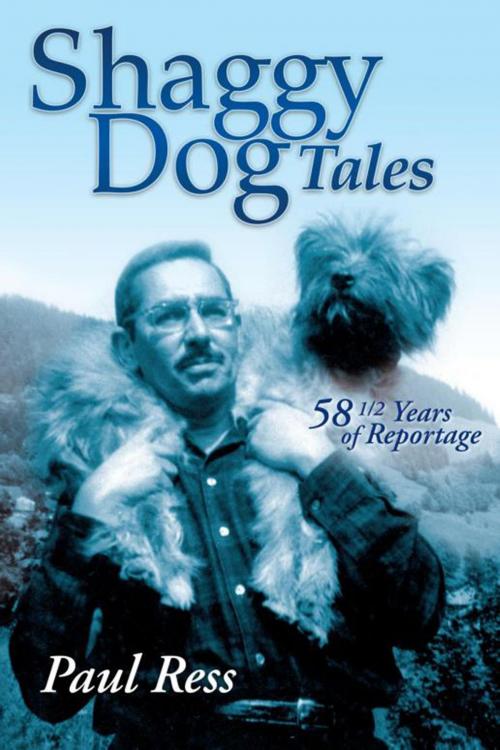Shaggy Dog Tales
58 1/2 Years of Reportage
Nonfiction, Entertainment, Humour & Comedy, General Humour| Author: | Paul Ress | ISBN: | 9781450098052 |
| Publisher: | Xlibris US | Publication: | October 24, 2006 |
| Imprint: | Xlibris US | Language: | English |
| Author: | Paul Ress |
| ISBN: | 9781450098052 |
| Publisher: | Xlibris US |
| Publication: | October 24, 2006 |
| Imprint: | Xlibris US |
| Language: | English |
The stories and the anecdotes in this book illustrate two kinds of journalism over a period of more than half a century.
During a span of almost 30 years as a journalist for major media, I was convinced that there was no life after journalism. Even losing my job as a reporter three times did not change my mind.
What did alter my outlook was the discovery of international and non-governmental environmental and public health organizations in and around the United Nations in Geneva that were doing good things.
Writing about their activities and seeing them reported not in one newspaper or magazine but in hundreds of publications and on radio and television stations around the world, was a satisfying experience. It was journalistic writing, and, sometimes, the press releases and feature stories really did make things move. Two examples.
A simple World Health Organization press release on arsenic in the drinking water in Bangladesh led to an investigation on the spot by a reporter of a major American newspaper. His syndicated story caught the attention of a Nordic government which agreed to finance efforts to try to rid the wells of the arsenic.
Another storyfor UNICEF this timeconcerned premature or underweight babies in Colombia in a region where hospitals had no incubators. The mother carried her baby close to her body beneath her sweater or dress rather like a kangaroo with a baby in her pouch. It saved their lives. They came to be known as kangaroo babies. A respected, large-circulation British newspaper read the feature, sent a team with a doctor, a nurse, a reporter, and a photographer to Colombia, and published a big cover story on the technique in their Sunday magazine. Articles about kangaroo babies keep popping up here and there, and the kangaroo system has spread.
BOOK REVIEW
From The Guardian
(British Mass-Circulation Daily)
by Simon Hoggart
Saturday December 23, 2006
You would think, with 200,000 books published in this country every year (of which around half are real books, the kind you might find in bookshops, as opposed to academic theses, instruction manuals etc), there would be no call for any more. Yet writing a book is something people feel an urgent need to do, like having children, which also costs a lot of money. Now, thanks to computers, what was once called the vanity press is inexpensive and booming. An author who's prepared to tour bookshops, give readings, get articles in the local press and so on, can sell quite a few copies - hundreds or even thousands. Some are lethally dull. Others are full of intriguing gems. You could compile a wonderful book just from the anecdotes about the famous. Take the American journalist Paul Ress who has been based in France almost all his working life and has produced Shaggy Dog Tales, jammed with stories about Miro, Picasso, Graham Greene, the Duke of Windsor and Le Corbusier.
At a lunch in Paris the playwright Eugene Ionesco told him the true story of the Unknown Romanian Soldier. The Romanians were the only country without their own. So late in the first world war they assembled the corpses of 10 freshly killed, unidentified men. The youngest in a troop of scouts was asked to choose one to be the Unknown Soldier. After he made his selection the press asked him why. "Because it was my father," the boy said. Ionesco added: "Later a Bucharest paper had a headline: Son of Unknown Soldier dies in Danube canoeing accident." It's a nice, gentle, funny book. You could find it through www.Xlibris.com.
The stories and the anecdotes in this book illustrate two kinds of journalism over a period of more than half a century.
During a span of almost 30 years as a journalist for major media, I was convinced that there was no life after journalism. Even losing my job as a reporter three times did not change my mind.
What did alter my outlook was the discovery of international and non-governmental environmental and public health organizations in and around the United Nations in Geneva that were doing good things.
Writing about their activities and seeing them reported not in one newspaper or magazine but in hundreds of publications and on radio and television stations around the world, was a satisfying experience. It was journalistic writing, and, sometimes, the press releases and feature stories really did make things move. Two examples.
A simple World Health Organization press release on arsenic in the drinking water in Bangladesh led to an investigation on the spot by a reporter of a major American newspaper. His syndicated story caught the attention of a Nordic government which agreed to finance efforts to try to rid the wells of the arsenic.
Another storyfor UNICEF this timeconcerned premature or underweight babies in Colombia in a region where hospitals had no incubators. The mother carried her baby close to her body beneath her sweater or dress rather like a kangaroo with a baby in her pouch. It saved their lives. They came to be known as kangaroo babies. A respected, large-circulation British newspaper read the feature, sent a team with a doctor, a nurse, a reporter, and a photographer to Colombia, and published a big cover story on the technique in their Sunday magazine. Articles about kangaroo babies keep popping up here and there, and the kangaroo system has spread.
BOOK REVIEW
From The Guardian
(British Mass-Circulation Daily)
by Simon Hoggart
Saturday December 23, 2006
You would think, with 200,000 books published in this country every year (of which around half are real books, the kind you might find in bookshops, as opposed to academic theses, instruction manuals etc), there would be no call for any more. Yet writing a book is something people feel an urgent need to do, like having children, which also costs a lot of money. Now, thanks to computers, what was once called the vanity press is inexpensive and booming. An author who's prepared to tour bookshops, give readings, get articles in the local press and so on, can sell quite a few copies - hundreds or even thousands. Some are lethally dull. Others are full of intriguing gems. You could compile a wonderful book just from the anecdotes about the famous. Take the American journalist Paul Ress who has been based in France almost all his working life and has produced Shaggy Dog Tales, jammed with stories about Miro, Picasso, Graham Greene, the Duke of Windsor and Le Corbusier.
At a lunch in Paris the playwright Eugene Ionesco told him the true story of the Unknown Romanian Soldier. The Romanians were the only country without their own. So late in the first world war they assembled the corpses of 10 freshly killed, unidentified men. The youngest in a troop of scouts was asked to choose one to be the Unknown Soldier. After he made his selection the press asked him why. "Because it was my father," the boy said. Ionesco added: "Later a Bucharest paper had a headline: Son of Unknown Soldier dies in Danube canoeing accident." It's a nice, gentle, funny book. You could find it through www.Xlibris.com.















